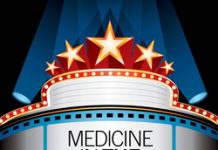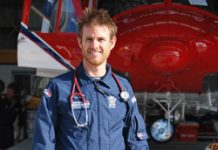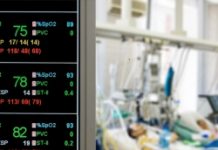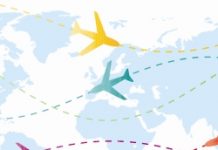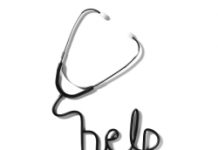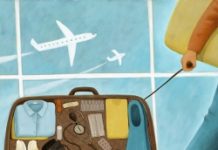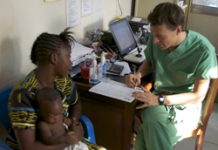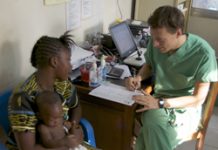 FY2 Dr Mikey Bryant is in Sierra Leone with healthcare charity Mercy Ships. He has been volunteering in a children’s clinic for a year in a country where one in five children don’t live to see their 5th birthday. In this regular column he gives us an update on his experience.
FY2 Dr Mikey Bryant is in Sierra Leone with healthcare charity Mercy Ships. He has been volunteering in a children’s clinic for a year in a country where one in five children don’t live to see their 5th birthday. In this regular column he gives us an update on his experience.
It’s another early start, only this time I’m not going straight to the clinic. Instead, I’ve been asked to travel to the north of the country to lead a course in emergency triage and treatment for sick children.
I climb out of the ‘poda poda’ (a minivan taxi) after a six hour journey wedged between two goats and a crowing chicken and I am instantly hit by the heat and barrenness of the town. I soon realise upcountry Sierra Leone is a completely different prospect to the capital Freetown.
Gone is the hurried mess of slums dotted with disrespectfully overpriced restaurants for the elite rulers, long past are the coloured market battlefields with their noisy bartering and aggressive sales pitches.
Here, I feel a bit like I’ve just walked into a town in the 19th century American Midwest at midday, complete with tumbleweeds drifting across a suspiciously deserted road – the normal residents slightly hidden and wary of strangers.
There seems to be just one road and the hospital is on it – the only building of any particular size in the town. The hospital superintendent, a doctor with about two years post-grad experience as far as I can work out, shows us around doing his best to make light of the government hospitals shortcomings. “We will have oxygen in the ICU soon” and “we won’t always have share the ceftriaxone doses between the children” being some of my favourite quotations.
It isn’t long before the inevitable tragic patient crashes the tour, as a distressed looking child is rushed in with his conjunctivae as pale as the sand outside. We all spring into action; everyone has seen severe respiratory distress secondary to malaria so there is no delay in getting some treatment started despite the hospital’s lack of malaria test kits and a working blood bank. Eventually a transfusion is improvised using blood from the child’s dad, who proves eager to help once he understands the implications of what is going on.
Soon after that we get the chance to meet the nurses who want to learn about triage, and at last we see something promising. I’m impressed by the enthusiasm and turnout, as the small room is packed out. There is a huge appetite for learning here. Given the huge gulf in nursing education as a result of the war’s devastation so many of the hospital staff have gleaned precious morsels of knowledge from textbooks dating back to colonial times as well as simply learning from older staff on the wards. As a result, there is a lot of knowledge that seems just a little off, like odd doses of ceftriaxone and rather large fluid doses.
As soon as I start explaining about the importance of maintaining babies’ airways, an excited ripple goes through the audience as they realise they are going to get a chance to practice on some of the model babies we’vebrought. Taking them out of the box makes me feel like Mary Poppins unpacking her never-ending suitcase.
It’s here that the knowledge gaps really start showing. When I give a scenario to one nurse about a newborn with neonatal asphyxia I am horrified to watch her pick up the baby by the leg and wave her back and forth hopefully. I try to intervene but am told that this will “help get air into the lungs and wet stuff out”. It takes a little while to go through the reason why this doesn’t work, but when I succeed there are smiles all round as understanding dawns. Soon there are more eager questions about what to do in all sorts of situations and we find ourselves dealing with very Sierra Leonean problems, such as what to do when your primary health unit has no masks for ventilation, or how to deliver fluid boluses when you have no giving sets around.
Later we have a chance to ask some of the nurses what they think of what we have taught them. In between the politely enthusiastic comments, there are still some disturbing oddities, including one extremely eccentric woman who refuses to accept that anterior fontanelles aren’t used for breathing, instead sticking to a theory that maybe babies in Sierra Leone are “made differently”.
I’m impressed by the hospitality, and amazed by how much productive learning can be done without Powerpoint or e-learning modules. On the way back to Freetown, sweating into the exposed foam on a ripped seat of a ‘poda poda’, I reflect on the simplicity of knowledge being passed on through partnerships and word of mouth. Until recently this was how learning worked, no fuss, none of the tick box exercises that plague so many of the learning opportunities in British training. I can only hope that the knowledge being passed on in that little tinroof hut saves lives and is remembered.
Read Mikey’s blog online at www.juniordr.com


